




More than a thousand protesters took to the streets of Hong Kong on Wednesday evening over a possible top-level intervention by Beijing, as two pro-independence lawmakers once more barged into the city's legislature in protest at their exclusion after their oaths were deemed invalid.
Sixtus "Baggio" Leung and Yau Wai-ching of the localist group Youngspiration, who were elected to the Legislative Council (LegCo) in last September's elections, used their swearing-in ceremony last month to pledge to represent the "Hong Kong nation" instead of swearing allegiance to China, inserting swear-words, slurs, and pro-independence slogans into their oaths.
They were unable to take up their seats, as their oaths were deemed invalid by LegCo chairman and pro-Beijing politician Andrew Leung.
Now, the government is seeking to bar them permanently from office with a judicial review in the High Court, which will be decided on Thursday.
The protest came after chief executive Leung Chun-ying said he hadn't ruled out asking China's rubber-stamp parliament, the National People's Congress (NPC), to issue an "interpretation" of Hong Kong's mini constitution, the Basic Law, in relation to the lawmakers' status.
Holding banners that read: "Oppose the interpretation of the law," and chanting for Leung Chun-ying's resignation, the protesters gathered outside Beijing's representative office on Wednesday evening.
Organizers told the Fragrant Harbour news blog that at least 1,600 had come out for the "hastily organized" event.
Democratic Party lawmaker Au Nok-hin, said he had come out of anger over growing rumors in the corridors of power that the Hong Kong government will ask Beijing to interpret the Basic Law if the Youngspiration duo aren't barred by the courts.
Trampling rule of law
"A lot of media reports are indicating that there is a likelihood that they will request this interpretation tomorrow," Au said. "I am extremely worried about this."
"Leung Chun-ying and many members of the [ruling] Chinese Communist Party's Basic Law committee have used administrative measures to trample the rule of law time and again," he said. "That is wrong."
"We have come on this demonstration to express our anger."
Meanwhile, the evening's session of the city's Legislative Council (LegCo) was curtailed after two lawmakers disrupted the meeting by pushing into the debating chamber after being banned from taking up their seats.
Sixtus Leung and Yau Wai-ching pushed past security guards to disrupt LegCo in protest at their ban after they were prevented from retaking their oaths by filibustering from pro-Beijing groups in the council.
Andrew Leung told reporters that six security guards had been sent to hospital after scuffles broke out.
"Mr Leung and Miss Yau, who brought along more than 10 persons, attempted to storm into Conference Room 1 today," he said. "Our security staff made their best effort to stop them in order to execute my previous order that the two members should not attend the council meeting."
"Mr Leung, Miss Yau ... insulted and bumped against our security staff. So far, six security staff injured and all of them were admitted to hospital."
Andrew Leung said he had called the police for assistance, and adjourned the meeting.
'Andrew Leung's mistake'
But pan-democratic politicians said the stand-off was his doing in the first place.
"Ultimately, it has to be Andrew Leung's mistake ... He shouldn't have disallowed them to take their oath, which is their constitutional right," Civic Party lawmaker Claudia Mo told reporters.
"Apparently the security guards got the order that no matter what, whatever happens, they must be banned, so they were forming literally a human wall at the doors, and I think that's how the security guards got hurt," she said.
University of Hong Kong law professor Eric Cheung told RFA that an interpretation by the NPC on such a matter would seriously undermine Hong Kong's legal system.
"If they issue an interpretation on this matter, it will be making it clear that, legally speaking ... the Basic Law isn't worth the paper it was written on," Cheung said.
"If the central government thinks it has to get involved in dictating ... who is qualified to be a LegCo member and who is not, then this will do huge damage to Hong Kong," he said.
While the NPC has previously ruled on political reforms for Hong Kong, Democratic Party member James To said his party is opposed to any interpretation being issued in this case.
"We in the Democratic Party are against an interpretation being issued, because if the NPC standing committee takes it upon themselves to do that, it will be a huge blow to Hong Kong's judicial independence," To said.
"It would shatter the autonomy of the courts, and also global confidence in the implementation of 'one country, two systems' in Hong Kong," he said, in a reference to the high degree of autonomy promised for the city under terms of the 1997 handover to Chinese rule.
His view was echoed by a statement from the Hong Kong Bar Association, which said such a move would "cause untold damage with no benefits."
Reported by Lam Kwok-lap for RFA's Cantonese Service. Translated and written in English by Luisetta Mudie.